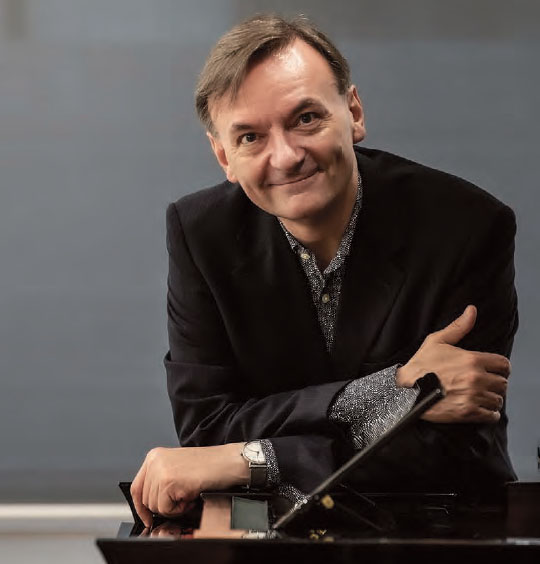Cal Performances hosted a full, appreciative crowd at UC Berkeley's Hertz Hall on Sunday afternoon for a concert by the Takács Quartet. My concert companion, James Parr, was wallowing in nostalgia over his undergraduate years where he had taken classes and performed with the university chorus in this same hall two decades ago. He was amusingly one-upped by the white-haired woman sitting next to him who had been at the 1953 opening of the lecture/concert hall when she was a freshman.
The string quartet formed in 1975 after meeting each other at the Music Academy in Budapest, Hungary. In 1983, they were offered a quartet-in-residence gig at the University of Colorado, Boulder, which is still the group's home base. The roster has changed over the years due to retirement and death, and the current group consists of: Richard O'Neill, viola (since 2020); András Fejér, cello (the only original member); Harumi Rhodes, second violin (since 2018); and Edward Dusinberre, first violin (since 1993). I had never heard the group before, although their name was familiar on account of Geraldine Walther, the beloved principal viola at the SF Symphony who jumped ship and joined the quartet in 2005.
The program began with a late Haydn Quartet, "Sunrise," which they performed with lots of dramatic flourishes, but I was not particularly impressed with their sound which felt heavy and muddy rather than illuminating. This, I must hasten to add, was a minority opinion because most of the musically sophisticated audience were on their feet for a standing ovation at the end.
They followed with a newly commissioned quartet by the polymath pianist/writer/composer/painter Stephen Hough. The quartet was recording the Ravel and Dutilleux string quartets and asked Hough for something to fill out the CD with his first string quartet. Hough's inspiration was the music of "Les Six," the sextet of French musicians between World War I and II who were lumped together as a group, and his six-movement work was thoroughly delightful, alternating between Gallic wit and British Catholic gay angst. I hope to hear it again.
Hough stayed busy during the pandemic. Rough Ideas is a recently published collection of his newspaper articles, blog posts, and observational jottings written in airports, hotels, and green rooms around the world. My favorite Francis Poulenc anecdote is included, and Hough's String Quartet No. 1 emulates a lot of its flavor. "A reliable, reputable source told me once of an occasional routine of Poulenc. In the late afternoon he would leave his apartment and go to the park where he would have a lustful tumble behind a bush with a willing soldier. He would then cross the park into the shadows of the Catholic church where he would slip into a dark confessional. After being absolved of his sins, and less than an hour after first leaving home, he would return to a sumptuous supper, all ready to be served along with a decanted bottle of fine red Bordeaux."
The second half of the program was Dvorak's Piano Quintet No. 2. Working from home, I often listen to a livestream of Bartok Radio from Budapest, and this work seems to be broadcast at least once a week, which is fine because it's so gorgeous. Hough was the pianist for the performance, and he was on a different, more brilliant musical plane than the strings, but it didn't matter. If you ever get a chance to hear him play piano live, do so, and Alex Ross at The New Yorker agrees with me.







No comments:
Post a Comment